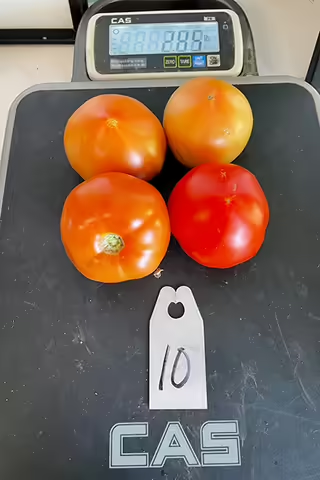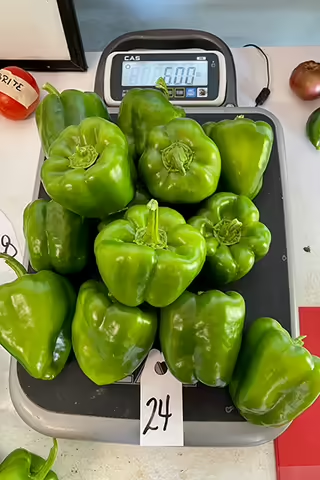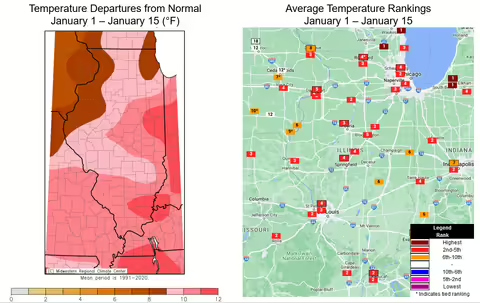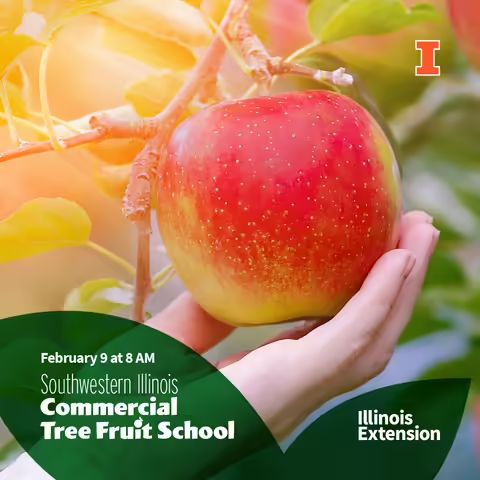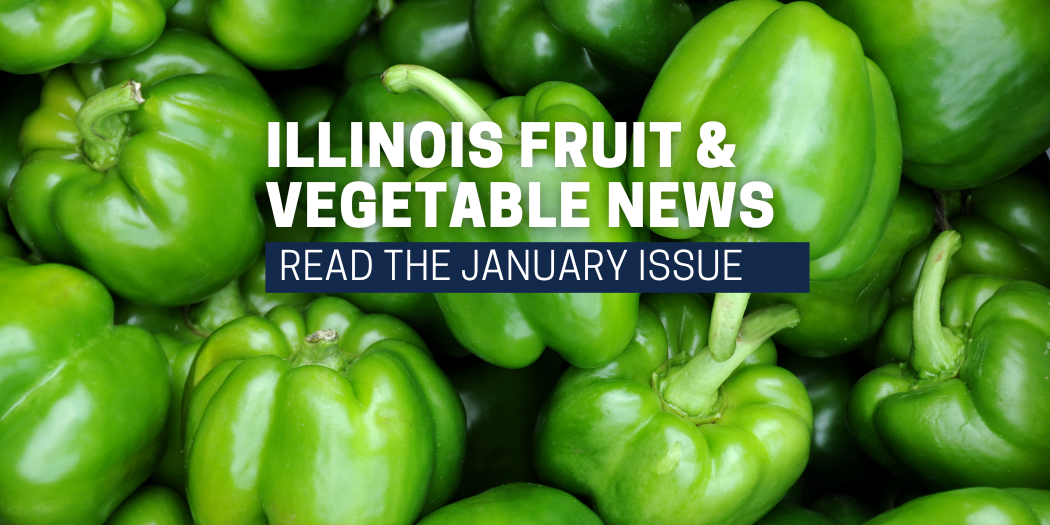
Top Honors at Illinois Sweet Cider Contests
The Illinois State Horticulture Society sponsored its 33rd Illinois and National Sweet Cider Contest and the 20th National Hard Cider Contest, held in conjunction with the From Food to Flowers Everything Local Conference on January 12 in Springfield.
Joe Ringhausen of Joe Ringhausen Orchard’s in Fieldon produced the top overall rated cider at this year’s contest, winning the Illinois contest. Joe used Jonathan, Gold Delicious, Red Delicious, and Fuji apples to make his winning cider.
Second place in the Illinois cider went to Wesley Carithers of Orchard Hill Farm in Lewiston, and third place went to Greg Durdan of Big Bear Orchard in Grand Ridge.
In the hard cider contest, the Wiles Family Orchard of Fairfield repeated as champions. Justin Wiles and Trevor Grissom produced their winning hard cider for this year’s contest with a combination of Gold Rush, Golden Delicious, and Fuji apples.
The sweet and hard cider contests are open to members of the Illinois Specialty Growers Association and Illinois State Horticultural Society.
Judges evaluated the cider entries using a 25-point rating scale for cider quality characteristics. The Illinois State Horticultural Society has conducted the sweet cider contest since 1990.
Hard cider entries were each individually awarded points based on characteristics, including clarity, color, bouquet, balance of alcohol, acidity, sweetness, sugar/acid balance, body, flavor, astringency and bitterness, any off-flavors, and overall quality.
The ISHS gratefully acknowledges the dedication and hard work of our judging team. Plus, a special thanks to Sangamon County Master Gardeners Marilyn Clarke, Steve and Sharon Petrilli, and Don Wisniewski. Thank you! Most importantly, thanks are extended to all who entered the contest this year. Start planning now for the next contest in 2024.
Ken Johnson: Cider Contest Coordinator, University of Illinois Extension Educator
217-234-7424; kjohns@illinois.edu
2022 High Tunnel Fresh Market Determinate Tomato Cultivar Trial for Southern Illinois
A determinate tomato cultivar trial was conducted at the University of Illinois Dixon Springs Agricultural Center located in southern Illinois in Pope County during the 2022 growing season. The objective of this trial was to compare performance of thirteen fresh market determinate tomato cultivars in a high tunnel production system.
Transplants used in the trial were grown at DSAC and set on April 18, 2022. Plants were grown on in-ground raised beds with two runs of trickle irrigation (4 inch emitter spacing) per bed and without plastic mulch within a high tunnel. Plants were set 24 inches apart in a single row per bed. The spacing between beds within this high tunnel is 20 inches, making the spacing between rows 3.5 feet. Plants were grown using a trellis weave and pruned to below first cluster. All plots were in a randomized complete block design and replicated four times.
Weekly fertilizer applications were made through the drip irrigation system starting a week after transplanting on April 22 and ending the last week of August. The following fertilizer products were used during the growing season; 20-20-20, potassium nitrate, calcium nitrate, potassium sulfate, and magnesium sulfate, delivering a total of
- 110 lbs/acre of nitrogen
- 35 lbs/acre of phosphorus
- 400 lbs/acre of potassium
- 55 lbs/acre of calcium
- 9 lbs/acre of magnesium.
The high tunnel containing this variety trial was also included in a biological insect control project and served as the control tunnel. No insecticides were applied during the growing season except for three applications of a Bt product to control tomato horn worm, army worm, and tomato fruit worm. No fungicides were needed or applied during the growing season.
The plots were harvested 16 times during the period from June 14 to August 29, 2022. The harvested fruit was sorted and graded based on USDA grades and standards for U.S. No. 1 and U.S. No. 2 tomatoes, and yield data was recorded accordingly. U.S. No. 1 fruit was a minimum of eight ounces in size, well formed, well developed, and showed no signs of decay or injury.
Cultivars are listed in descending order of total pounds per plant of U.S. No. 1 fruit harvested in Table 1.
- ‘Mountain Gem’ had significantly higher yields of total pounds per plant U.S. No. 1 fruit over the course of the harvest season.
- ‘Patsy’ yielded significantly higher than all other varieties except ‘BHN 589’ in total pounds per plant of U.S. No. 2 fruit.
- Observations made during the season indicate that fruit quality on ‘Mountain Gem,’ ‘BHN 589,’ and ‘Red Deuce’ was very good; displaying smooth, large fruit with minimal cracking.
- Early season harvests showed little insect damage but harvests from late July and August suffered damage from thrips and stink bug.
- ‘Patsy’ was a consistent yielder with uniform, smaller fruit. Fruit size of U.S. No. 1 grade across all varieties ranged from two thirds to three quarters of a pound per fruit, well above the minimum of half a pound per fruit required to meet U.S. No.1 grade.
- Every variety to some degree suffered from yellow shoulder disorder this growing season.
| Total No. 1 Yield** | Total No. 2 Yield | Total Marketable Yield | Total No.1 Fruit | Culls | Fruit Size | |
| ----------U.S. No. 1------- | U.S. No. 1 & No. 2 | U.S. No. 1 | ||||
| Cultivar | lbs per plant | no./plant | oz/fruit | |||
| Mountain Gem | 19.3 a | 8.3 | 27.6 | 25.4 | 6.1 | 12.2 |
| Red Snapper | 14.5 b | 10.7 | 25.2 | 18.5 | 7.7 | 12.5 |
| Red Deuce | 14.3 b | 9.3 | 23.6 | 18.9 | 7.1 | 12.1 |
| Red Morning | 13.8 b | 8.7 | 22.5 | 18.1 | 9.3 | 12.2 |
| Rambler | 13.7 b | 7.3 | 21.0 | 18.0 | 5.1 | 12.2 |
| Thunderbird | 12.6 bc | 11.8 | 24.4 | 17.2 | 9.8 | 11.8 |
| Patsy | 11.6 bcd | 18.9 | 30.5 | 18.0 | 10.1 | 10.3 |
| STM 2255 | 11.6 bcd | 12.1 | 23.7 | 16.6 | 12.4 | 11.2 |
| Summerhaven | 11.5 bcd | 12.9 | 24.4 | 17.0 | 10.0 | 10.8 |
| BHN 589 | 10.6 bcd | 14.3 | 24.9 | 15.5 | 8.2 | 11.0 |
| HM 8148 | 9.2 cd | 12.5 | 21.7 | 12.5 | 8.6 | 11.8 |
| Camaro | 9.0 cd | 11.0 | 20.0 | 12.8 | 12.7 | 11.3 |
| BHN 871 | 8.1 d | 10.6 | 18.8 | 12.7 | 3.7 | 10.2 |
| *4 replication average | ||||||
| **descending order based on Total Yield No. 1. | LSD 4.012 | |||||
Acknowledgements: J. Zakes and J. Warren assisted with field work and data collection on site at the Dixon Springs Agricultural Center. Seedway graciously donated the seed used in this trial.
Bronwyn Aly: 618-695-2441; baly@illinois.edu
2022 DSAC High Tunnel Bell Pepper Variety Trial
This paper reports on seven bell pepper cultivar entries evaluated in a high tunnel production system during the 2022 growing season at the University of Illinois Dixon Springs Agricultural Center (DSAC) located in southern Illinois (Pope County).
The plots were established from transplants set on April 18, 2022. Plants were grown on in-ground raised beds with twin rows of plants spaced at 12 inches between plants and 8 inches between the twin rows with two runs of trickle irrigation (4 inch emitter spacing) per bed and without plastic mulch. The spacing between beds within this high tunnel is 20 inches, making the spacing on each side of the twin rows 3 feet. All plots were replicated four times in a randomized complete block design.
Weekly fertilizer applications were made through the drip irrigation system starting a week after transplanting on April 22 and ending the last week of August. The following fertilizer products were used during the growing season; 20-20-20, potassium nitrate, calcium nitrate, potassium sulfate, and magnesium sulfate, delivering a total of
- 120 lbs/acre of nitrogen
- 35 lbs/acre of phosphorus
- 415 lbs/acre of potassium
- 60 lbs/acre of calcium
- 9 lbs/acre of magnesium.
The high tunnel containing this variety trial was also included in a biological insect control project and served as the control tunnel. No insecticides were applied during the growing season except for three applications of a Bt product to control tomato horn worm, army worm, and tomato fruit worm. No fungicides were needed or applied during the growing season.
The plots were harvested weekly for the period from June 15 to August 31, 2022, providing a total of 12 harvests. The harvested fruit was sorted and graded based on USDA grades and standards for U.S. No. 1 and U.S. No. 2 sweet peppers, and yield data was recorded accordingly.
Cultivars are listed in descending order of total pounds of U.S. No. 1 fruit harvested per plant in Table 1.
- ‘Vanguard’ and ‘SV3964PB’ significantly outperformed ‘Boca,’ ‘Tarpon,’ and ‘Sailfish’ in total pounds of U.S. No. 1 fruit, but there was no significant difference from ‘Karisma’ or ‘Aristotle.’
- In regards to the total pounds of U.S. No. 2 fruit harvested, ‘Sailfish,’ ‘Karisma,’ and ‘Tarpon’ had significantly higher yields than ‘Vanguard,’ ‘Aristotle,’ and ‘SV3964PB.’
- Average fruit size of U.S. No. 1 grade was relatively uniform across all varieties.
- Observations made during the growing season included the following: ‘SV3964PB’ was noted to be elongated or tapered; ‘Vanguard’ and ‘Karisma’ were extra-large and blocky; and ‘Aristotle’ tended to sunscald and was slightly tapered.
| Total No. 1 Yield | Total No. 2 Yield | Total Marketable Yield | Culls | BER | Fruit Size | |||
| -----U.S. No. 1------ | -----U.S. No. 2------ | U.S. No. 1 & No. 2 | U.S. No. 1 | |||||
| Cultivar | fruit per plant | lbs per plant** | fruit per plant | lbs per plant | lbs per plant | fruit per plant | oz per fruit | |
| Vanguard | 4.2 | 1.8 a | 5.1 | 1.7 | 3.5 | 1.6 | 0.1 | 7.0 |
| SV3964PB | 3.7 | 1.5 a | 5.1 | 1.6 | 3.1 | 1.0 | 0.2 | 6.6 |
| Karisma | 3.2 | 1.4 ab | 7.3 | 2.3 | 3.7 | 1.5 | 0.2 | 7.0 |
| Aristotle | 3.3 | 1.4 ab | 4.7 | 1.6 | 3.0 | 1.5 | 0.0 | 6.9 |
| Boca | 2.4 | 1.1 b | 5.4 | 1.9 | 3.0 | 1.6 | 0.2 | 7.2 |
| Tarpon | 2.4 | 1.0 b | 6.1 | 2.0 | 3.0 | 1.9 | 0.2 | 6.9 |
| Sailfish | 0.8 | 0.3 c | 8.0 | 2.4 | 2.8 | 3.2 | 0.1 | 6.7 |
| *4 replication average | ||||||||
| **descending order based on total yield No. 1 lbs per plant LSD 0.435 | ||||||||
Acknowledgements: J. Zakes and J. Warren assisted with field work and data collection on site at the Dixon Springs Agricultural Center. Seedway donated the seed used in this trial.
Bronwyn Aly: 618-695-2441; baly@illinois.edu
St. Louis Metro East Regional Report
The big concern right now is the peach crop, following 2 nights of sub-zero temperatures on December 23 and 24. Most of the Illinois peach growing areas reported a low of around -6°F on the evening of December 23, which constituted a 40+°F drop in temperature within a rather short time frame. Some cultivars like ‘Loring’ are getting more reports of significant bud kill, and according to Bill Shane, Extension tree fruit specialist at Michigan State University, ‘John Boy,’ ‘Glenglo,’ ‘Bellaire,’ and ‘Bounty’ tend to have similar fruit characteristics to ‘Loring,’ including an earlier showy bloom, and more cold tender. Apples are good so far, as well as protected strawberries. More will be reported as fruit crops continue to be assessed.
The Food Safety Certification for Specialty Crops Program provides assistance to specialty crop operations that incurred eligible on-farm food safety program expenses in 2022 and 2023. The application deadline for the 2022 program year is January 31, 2023. Don’t miss out. Visit your local USDA-FSA Service Center to discuss your eligibility and submit an application.
The Agritourism Liability Insurance Tax Credit Application is available through the Illinois Department of Agriculture. For taxable years beginning on or after January 1, 2022, and ending on or before December 31, 2023, any individual or entity that operates an agritourism operation in the state during the taxable year shall be entitled to a tax credit against the tax imposed by subsections (a) and (b) of Section 201 equal to the lesser of 100% of the liability insurance premiums paid by that individual or entity during the taxable year or $1,000.
- Once you fill out the application, IDoA will verify your eligibility, then issue a tax credit certificate that you will attach to your tax return.
- You must have this certificate to claim the tax credit.
- You will need to apply separately for 2022 and 2023.
I’ve talked to growers who have already applied, and they tell me the process is easy. The deadline for applying for 2022 Tax Year is February 28, 2023, so don’t delay.
The Illinois Farmers Market Association has opened enrollment for the 2023 IFMA Farmers Market Manager Certification Program. This virtual, interactive program is packed with information and tools to help you address real-world market issues that crop up. You'll learn best practices for all aspects of your market! The certification program meets from 6:30-8 p.m. for 9 weeks starting Monday, January 23. Register for the certification program
The Illinois Specialty Crops Conference was always a great meeting, but it got even better this year when combined with the Live Local: Local Food and Farmers Market Conference. The inaugural From Food to Flowers: Everything Local Conference was successfully held at the Springfield Crowne Plaza January 11-13 with over 650 participants attending via in-person and virtual formats.
In addition to the educational program and trade show, the awards program was a time to recognize certain individuals in the industry for their achievements. For the Illinois State Horticulture Society cider contests, Ken Johnson of UI Extension announced the winners.
For the 33rd ISHS Illinois Sweet Cider contest,
- Third place went to Greg Durdan of Big Bear Orchard
- Second place went to Wes Carithers of Orchard Hill Farm
- First place went to Joe Ringhausen of Joe Ringhausen Orchards.
For the 20th Illinois State Horticulture Society Hard Cider contest, the Champion cider was submitted by Justin Wiles and Trevor Grissom of Wiles Family Orchard.
Janie Maxwell, Executive Director of the Illinois Farmers Market Association recognized seven individuals in attendance who had completed the ILFMA Certified Market Managers program.
Zaelon Rohwedder, president of the Farmer Veteran Coalition of Illinois, recognized the recipients of the Home Grown by Heroes Farmer Veteran of the Year
- 2021 (Tony Pferschy, Garlic Breath Farm)
- 2022 (Brad Dearing, Dearing Country Farms)
- 2023 (Brent Glays, Flock Farm)
Steve Ericson, executive director of Feeding Illinois, presented Friend of the Food Bank of the Year Award to Wayne and Michele Sirles of Rendleman Orchards.
Randy Graham, chairman of the Illinois Specialty Growers Association, presented the 2022 Award of Excellence to Amelia and Michael Howard of Eden Place Nature Center and to Tom Schwartz.
Congratulations to all those who were recognized for the dedication to their craft, to the sustainability of the industry, and for their support to our communities.
Elizabeth Wahle: 618-344-4230; wahle@illinois.edu
Elizabeth Wahle (618-344-4230; wahle@illinois.edu)
Southwestern Illinois Regional Report from Waterloo
After the bitter cold in late December, January has actually been reasonably mild so far. Late December brought some very cold weather with a few days not even breaking 0°F and lows down to about -6°F. Unlike some polar blasts, this one at least only lasted a few days. Snow totals right around Christmas were only an inch or two although it stayed around for a few days with the cold. Since the new year we have stayed in the 40s and 50s for highs most days. Sunshine has been hit and miss and we have had some rains that have kept the soil fairly wet, although we are still trying to rebound soil moisture from drought conditions this fall.
There is not a lot going on out in the field aside from some pruning on fruit crops. High tunnels have been growing slow. Most were able to come through the cold ok with some added row covers and protection. I have a small low tunnel with some spinach and lettuce seeded mid-fall It had a double layer of 1 oz row cover, and it is protected on the east side from direct wind. From last year, I knew that especially the lettuce would be tough to survive so I added a piece of clear plastic over the row cover. This seemed to help greatly, and I had little damage from the cold. The plastic helped to reduce some of the drying and stress from the very windy conditions we had in addition to the actual temperature.
Is the worst of winter behind us? It feels that way, but we all know that we have about two more months until spring is here.
Nathan Johanning: 618-939-3434; njohann@illinois.edu
Dixon Springs Ag Center Regional Update
In the last month or so, we have combed through seed and supply catalogs and placed orders for materials that we will need for this coming season including transplant supplies, irrigation fittings, media, fertilizer, et al. We have utilized this “downtime” to make plans for what demonstration plots will be included in the high tunnels this season that will compliment the on going research projects. Considering the large number of tomato plants that will be grown in two of the high tunnels, we plan to look at the effects of alternative pruning techniques on tomato yields.
Regarding the status of the cover crops that were planted as part of our most recently funded biological insect control project, he spring oats did winter kill during the cold snap that was experienced in December just before Christmas, and this was expected. The crimson clover has shown no signs of damage from the cold temperatures. Yellow sticky traps continue to be replaced weekly and are used to help assess what insects are present within the high tunnels.
I was grateful to be a part of the From Food to Flowers: Everything Local conference last week in Springfield and I enjoyed seeing so many enthusiastic and optimistic faces of both old and new acquaintences.
Brownyn Aly: 618-695-2441, baly@illinois.edu
Whither Winter?
December 2022 was slightly cooler than normal statewide, thanks to some very cold air that settled in around Christmas Eve. Actual temperatures on December 23 and 24 included -15 degrees in Knox County and -12 in McLean County. Combined with 40 to 50 mph wind gusts, wind chill temperatures approached -40 degrees.
However, since the last week of December we have experienced a prolonged warm spell across the state. Average temperatures in the first 15 days of the year have been 8 to 12 degrees above normal (Figure 1). In fact, the first half of January has been a top 5 warmest on record across the state; only 1880, 1939, and 2006 had a warmer first half of the month than this year in Springfield.
Most of Illinois has been slightly to somewhat drier than normal since the start of winter. Precipitation deficits back to December 1st range from 1.5 to 1.6 inches below normal in central and western Illinois to just a quarter of an inch in northwest and far southern Illinois. Despite the warmer weather to start the year, persistently cloudy conditions have kept evaporation minimal, so soil moisture conditions have improved somewhat since the start of winter. In response to the relatively wetter conditions, the US Drought Monitor removed all severe and extreme drought in southern Illinois.
The combination of warmer and drier weather has kept snowfall well below normal so far this season. Most of the state north of Interstate 64 have had 4 to 12 inches below normal snowfall since October 1st, while southern Illinois remains 1 to 4 inches above normal thanks to a couple of early season snow events.
Near-term outlooks show milder, albeit wetter, weather across the state over the next 7 to 10 days. However, models are hinting at a potential shift to colder weather coming in the last week of January. Outlooks through the end of the month also indicate more active weather, with near to above normal precipitation. So, snow lovers need not despair yet.
Trent Ford, Illinois State Climatologist: 217-244-1330; twford@illinois.edu
Stateline Fruit and Vegetable Growers Conference (Northern Illinois/Rockford, IL)
Join University of Illinois Extension for our 27th Annual Stateline Fruit and Vegetable Growers Conference (go.illinois.edu/stateline2023) at NIU Rockford on Monday, February 6. This conference is held each year to provide established and beginning fruit-vegetable growers that sell directly to consumers with the information they need to implement new practices, diversify their crops, and hear about relevant research from University of Illinois Extension and University of Wisconsin-Madison educators and specialists.
We’re pleased this year to have Dr. Emily Lavely, a Tree Fruit Educator at Michigan State, joining us for a keynote on roots and a breakout session on apple tree pruning. Additional topics this year will be fruit and vegetable diseases and insects, pumpkins, urban-agriculture research in high tunnels, weed management, and day-neutral strawberries.
Additional topics for the breakouts will include high tunnel vegetable research, day-neutral strawberries, and mechanical weed management. Drs. Mohammad Babadoost and Kacie Athey will be providing their yearly grower and research updates for the fruit-vegetable tracks. For our breakouts, we’ll be joined by Zack Grant, Local Foods and Small Farms Educator for Cook County, and Sam Oschwald-Tilton, Vegetable Educator for UW-Madison.
Cost for the program is $35 per person with $25 for each additional employee from the same organization. To register, please visit go.illinois.edu/stateline2023 or call 815-986-4357. Registration deadline is Friday, February 3 for this conference. For any further information or assistance, contact Grant McCarty gmccarty@illinois.edu or Sarah Farley sfarley@illinois.edu.
2023 Southern IL Fruit and Vegetable School Held in Mt Vernon
Growers from the region will gather for the 2023 Southern Illinois Fruit and Vegetable School on Wednesday, February 8, in Mt. Vernon. This program, sponsored by University of Illinois Extension, will be held at the Double Tree Conference Center in Mt. Vernon. Registration starts at 7:45 a.m. The program runs from 8:00 a.m. to 4:00 p.m. Download the flyer to see what's in store this year.
The program will feature four separate tracks to address vegetable, small fruit, tree fruit, and flower production, bringing informative, practical, and up-to-date research-based information to address the challenges of growing fruit and vegetables commercially in Southern Illinois.
On the production side, the University of Illinois Food Crops team and guest speakers will be on hand to present a wide range of important educational topics. Current trends in insect and disease management, as well as a variety of other production-related topics, will be discussed.
Vendors will be on hand to discuss your production needs as in past years. As this is a principal activity, the time has been scheduled during the program to allow plenty of time to visit with vendors and other growers.
Advanced Registration for the Mt. Vernon School is $50 per farm by February 6. Late and at-door registration is $60 per farm. For advanced registration, visit our online registration page or contact Wahle at 618-344-4230 or wahle@illinois.edu .
If you need disability accommodations to participate in this program, please call the Extension office at 618-344-4230. University of Illinois Extension provides equal opportunities in programs and employment.
2023 Southwestern Illinois Commercial Tree Fruit School
Meet this year's uncertainties with practical research-tested best practices from industry experts by
attending the 2023 Southwestern Illinois Commercial Tree Fruit School. This year’s program features a wide range of topics to help you meet the challenges of commercial fruit production in Southwestern Illinois. Industry representatives will also be on hand to talk about their latest products and services.
Current trends in insect and disease management and a variety of other production-related topics will be discussed. Speakers include:
- Mohammad Babadoost with University of Illinois discussing peach and apple diseases.
- Trent Ford, State Climatologist with the Illinois State Water Survey, with a review of 2022 and a look forward to 2023 and beyond.
- Kacie Athey with University of Illinois reviewing tree fruit pest management.
- Rick Kraus with Valent U.S.A., LLC discussing a new option for apple and peach thinning.
- Elizabeth Wahle with University of Illinois Extension discussing recent research on EverCrisp apples.
This year's school will take place on February 9, 2023, at the Knights of Columbus Hall in Hardin (19899 Illinois River Road). Registration includes one copy of the 2023 Midwest Spray Guide.
Advanced registration by February 1 is $40.00 per person. Orchards sending more than one employee: $40.00 for the first person and $35.00 for each additional person. Lunch is included. Registration after February 2 is $50.00 per person. You can register online at go.illinois.edu/treefruitschool or contact Ken Johnson, kjohns@illinois.edu or 217-234-7424, for more information.
Two New Webinar Series’ Offered Starting in February
I am happy to announce that the Beginning Apple Grower Webinar Series and High Tunnel Berry Production Webinar Series will be starting February 9 at noon and will continue each Thursday. The first webinar will be part of the apple series and it will be “Preparing a Site and Planting Trees.” Details and registration information can be found here. This series is brought to you by the University of Minnesota, University of Wisconsin, Iowa State University, and the University of Illinois. For more information on these new webinar series, contact Kacie Athey at 217-244-9916 or kathey@illinois.edu .
Kacie Athey: 217-244-9916; kathey@illinois.edu
Upcoming Events
Stateline Fruit and Vegetable Growers Conference (Northern Illinois/Rockford, IL)
Monday February 6, 2023 in Rockford, IL.
Register online at go.illinois.edu/stateline2023 or contact Grant McCarty gmccarty@illinois.edu or Sarah Farley sfarley@illinois.edu for more information.
Southern Illinois Fruit and Vegetable School
Wednesday February 8, 2023 in Mt. Vernon, IL at the Doubletree Inn.
Register online at go.illinois.edu/2023Fruit-VegSchool or contact Elizabeth Wahle, wahle@illinois.edu or 618-344-4230 for more information.
Southwestern Illinois Tree Fruit School
Thursday February 9, 2023 in Hardin, IL at the Knights of Columbus Hall.
Register online at go.illinois.edu/treefruitschool or contact Ken Johnson, kjohns@illinois.edu or 217-234-7424 for more information.
Top 10 Signs Your Family is Stressed
10. Conversations often begin with, "Put the phone down, I’m not interested in the latest TikTok challenge!”
9. The school principal has your number on speed-dial.
8. The cat is on Valium.
7. People have trouble understanding your kids, because they learned to speak through clenched teeth.
6. You are trying to get your four-year-old to switch to decaffeinated.
5. The number of jobs held down by family members exceeds the number of people in the family.
4. No one has time to wait for microwave TV dinners.
3. "Family meetings" are often mediated by a mental health professional joining via Zoom.
2. You have to check your kid's day-planner to see if they can take out the trash.
1. Maxwell House gives you industrial rates.
University of Illinois Extension Fruit and Vegetable Specialists
Extension Educators – Local Food Systems and Small Farms
- Bronwyn Aly: Gallatin, Hamilton, Hardin, Pope, Saline, and White Counties | 618-695-2441 | baly@illinois.edu
- Katie Bell: Franklin, Jackson, Perry, Randolph, and Williamson Counties | 618-687-1727 | klbell@illinois.edu
- Sarah Farley: Lake and McHenry Counties | 847-223-8627 | sfarley@illinois.edu
- Nick Frillman: Woodford, Livingston, and McLean Counties | 309-663-8306 | frillma2@illinois.edu
- Zachary Grant: Cook County | 708-679-6889 | zgrant2@illinois.edu
- Doug Gucker: DeWitt, Macon, and Piatt Counties | 217-877-6042 | dgucker@illinois.edu
- Grace Margherio: Jackie Joyner-Kersee Center, St. Clair County | 217-244-3547 | gracem@illinois.edu
- Grant McCarty: Jo Daviess, Stephenson, and Winnebago Counties | 815-235-4125 | gmccarty@illinois.edu
- Kathryn Pereira: Cook County | 773-233-2900 | kpereira@illinois.edu
Extension Educators – Horticulture
- Chris Enroth: Henderson, Knox, McDonough, and Warren Counties | 309-837-3939 | cenroth@illinois.edu
- Andrew Holsinger: Christian, Jersey, Macoupin, and Montgomery Counties | 217-532-3941 | aholsing@illinois.edu
Extension Educators – Commercial Agriculture
- Elizabeth Wahle: Fruit and Vegetable Production | 618-344-4230 | wahle@illinois.edu
- Nathan Johanning: Madison, Monroe, and St. Clair Counties | 618-939-3434 | njohann@illinois.edu
Campus-based Extension Specialists
- Kacie Athey: Entomology | 217-244-9916 | kathey@illinois.edu
- Mohammad Babadoost: Plant Pathology | 217-333-1523 | babadoos@illinois.edu
The Illinois Fruit and Vegetable News is a production of University of Illinois Extension and provides timely, research-based information that commercial fruit & vegetable growers can apply to benefit their farming operations.
Address any questions or comments regarding this newsletter to the individual authors listed after each article or to its editors, Nathan Johanning, 618-939-3434, njohann@illinois.edu or Bronwyn Aly 618-695-2441, baly@illinois.edu.
To receive or be removed from email notification of new postings of this newsletter, contact Nathan Johanning or Bronwyn Aly.
Download this Issue
Download this issue and share with others.
